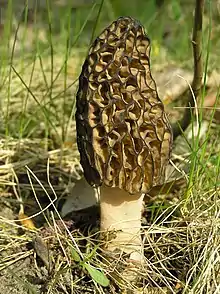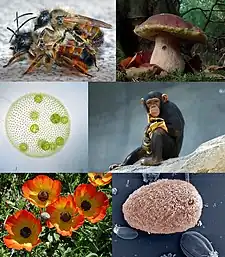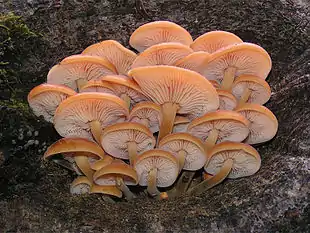fungus
English
Etymology
Borrowed from Latin fungus (“mushroom”).
| Picture dictionary | |||
|---|---|---|---|
| |||
|
Noun
fungus (countable and uncountable, plural fungi or (nonstandard, rare) funguses)
- (mycology) Any member of the kingdom Fungi; a eukaryotic organism typically having chitin cell walls but no chlorophyll or plastids. Fungi may be unicellular or multicellular.
- 2013 July 20, “Welcome to the plastisphere”, in The Economist, volume 408, number 8845:
- Plastics are energy-rich substances, which is why many of them burn so readily. Any organism that could unlock and use that energy would do well in the Anthropocene. Terrestrial bacteria and fungi which can manage this trick are already familiar to experts in the field.
- (now rare, pathology) A spongy, abnormal excrescence, such as excessive granulation tissue formed in a wound.
Hyponyms
- (organism): ascomycete, basidiomycete, mold, mushroom, toadstool, yeast
Derived terms
- ambrosia fungus
- artillery fungus
- artist's fungus
- bird's nest fungus
- black fungus
- bleeding tooth fungus
- bracket fungus
- cannonball fungus
- caterpillar fungus
- club fungus
- coal fungus (Daldinia concentrica)
- coral fungus
- cup fungus
- dark fungus
- face fungus
- fly fungus
- fungal
- fungicidal
- fungicide
- fungoid
- fungus beetle
- fungus comb
- fungus garden
- fungus gnat
- fungus-growing ant
- fungus moth
- fungus weevil
- ghost fungus
- honey fungus
- hoof fungus
- jelly fungus
- nail fungus
- pleasing fungus beetle
- rust fungus
- sac fungus
- sewage fungus
- shelf fungus
- shotgun fungus
- snow fungus
- sulfur fungus
- sulphur fungus
- toothed jelly fungus
- tooth fungus
- whiskey fungus
- zombie fungus
Related terms
Descendants
- → Irish: fungas
Translations
any member of the kingdom Fungi
|
Dutch
Pronunciation
- IPA(key): /ˈfʏŋ.ɡʏs/, /ˈfʏŋ.ɣʏs/
Audio (file) - Hyphenation: fun‧gus
French
Pronunciation
- IPA(key): /fɔ̃.ɡys/
Indonesian
Latin

fungus (a mushroom)
Etymology
Originally sfungus. Along with Ancient Greek σπόγγος (spóngos), "sponge" (whence Latin spongia), σφόγγος (sphóngos), and Old Armenian սունկն (sunkn), likely a loanword from a non-Indo-European substrate language. Possibly also related to Georgian სოკო (soḳo), Tsez зикӏу (zik’u), Bezhta сакӏо (sakʼo), Moksha панга (panga) and Erzya панго (pango, “mushroom”). Linguists such as Kluge and Kroonen have suggested a connection to English swamp and its Germanic cognates.
Pronunciation
- (Classical) IPA(key): /ˈfun.ɡus/, [ˈfʊŋɡʊs̠]
- (modern Italianate Ecclesiastical) IPA(key): /ˈfun.ɡus/, [ˈfuŋɡus]
Noun
fungus m (genitive fungī); second declension
Declension
Second-declension noun.
| Case | Singular | Plural |
|---|---|---|
| Nominative | fungus | fungī |
| Genitive | fungī | fungōrum |
| Dative | fungō | fungīs |
| Accusative | fungum | fungōs |
| Ablative | fungō | fungīs |
| Vocative | funge | fungī |
Related terms
- fungidus
Descendants
References
- De Vaan, Michiel (2008) Etymological Dictionary of Latin and the other Italic Languages (Leiden Indo-European Etymological Dictionary Series; 7), Leiden, Boston: Brill, →ISBN
- Martirosyan, Hrach (2010) Etymological Dictionary of the Armenian Inherited Lexicon (Leiden Indo-European Etymological Dictionary Series; 8), Leiden and Boston: Brill, pages 586–587
- “fungus”, in Charlton T. Lewis and Charles Short (1879) A Latin Dictionary, Oxford: Clarendon Press
- “fungus”, in Charlton T. Lewis (1891) An Elementary Latin Dictionary, New York: Harper & Brothers
- fungus in Charles du Fresne du Cange’s Glossarium Mediæ et Infimæ Latinitatis (augmented edition with additions by D. P. Carpenterius, Adelungius and others, edited by Léopold Favre, 1883–1887)
- fungus in Gaffiot, Félix (1934) Dictionnaire illustré latin-français, Hachette.
- Carl Meißner, Henry William Auden (1894) Latin Phrase-Book, London: Macmillan and Co.
- (ambiguous) to perform the last rites for a person: supremo officio in aliquem fungi
- (ambiguous) to live a perfect life: virtutis perfectae perfecto munere fungi (Tusc. 1. 45. 109)
- (ambiguous) to do one's duty: officio suo fungi
- (ambiguous) to perform official duties: munere fungi, muneri praeesse
- (ambiguous) to perform the last rites for a person: supremo officio in aliquem fungi
This article is issued from Wiktionary. The text is licensed under Creative Commons - Attribution - Sharealike. Additional terms may apply for the media files.



